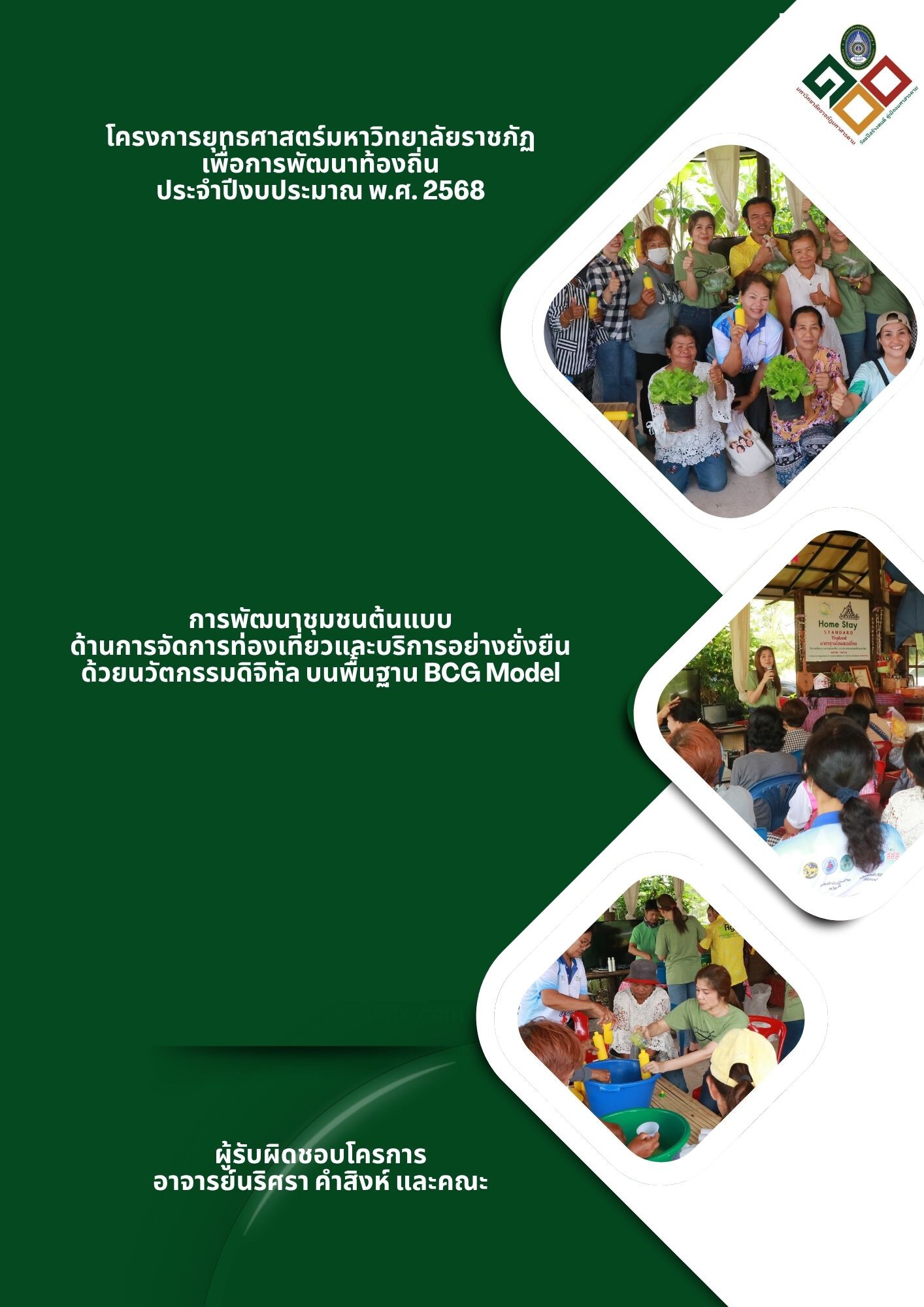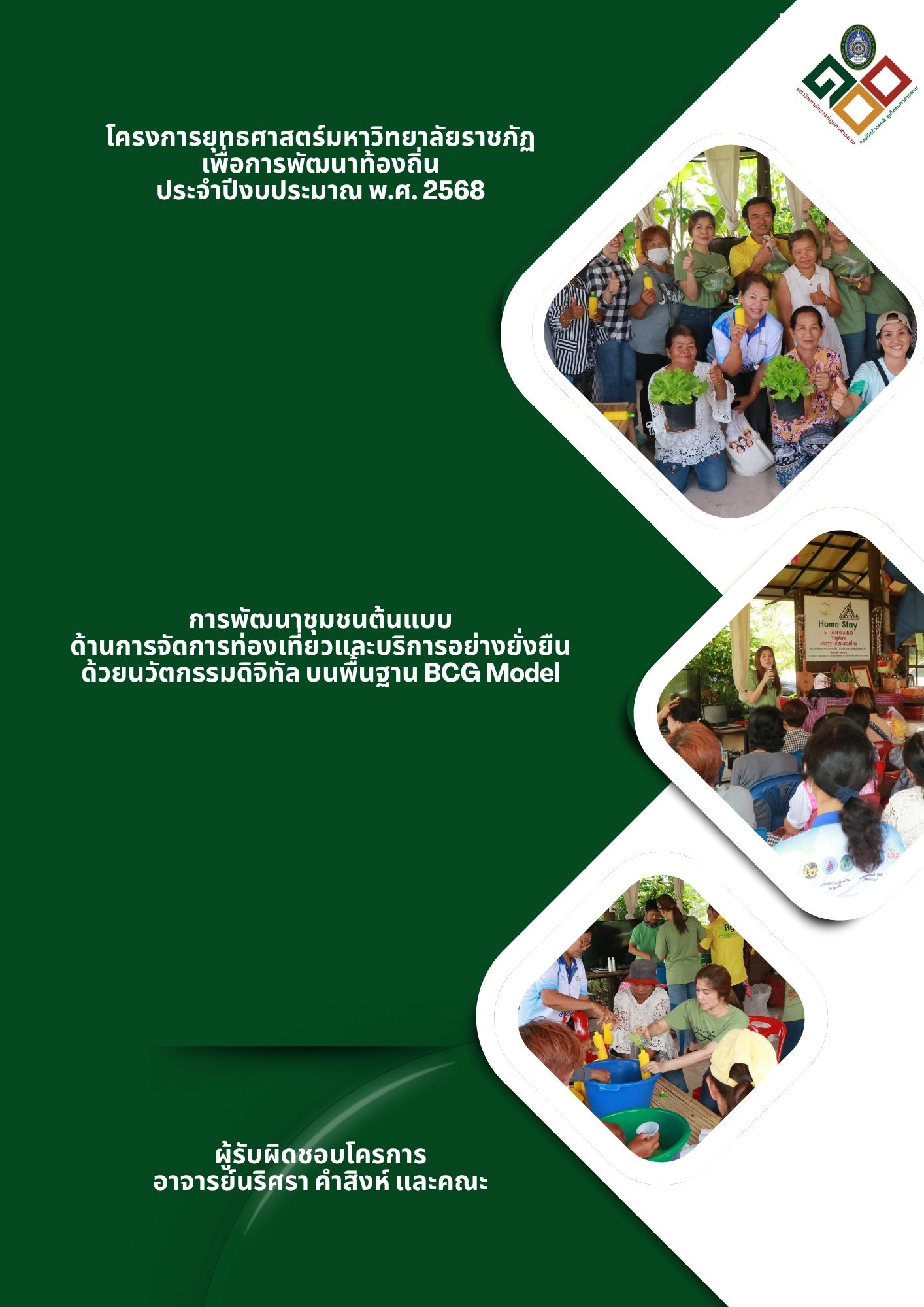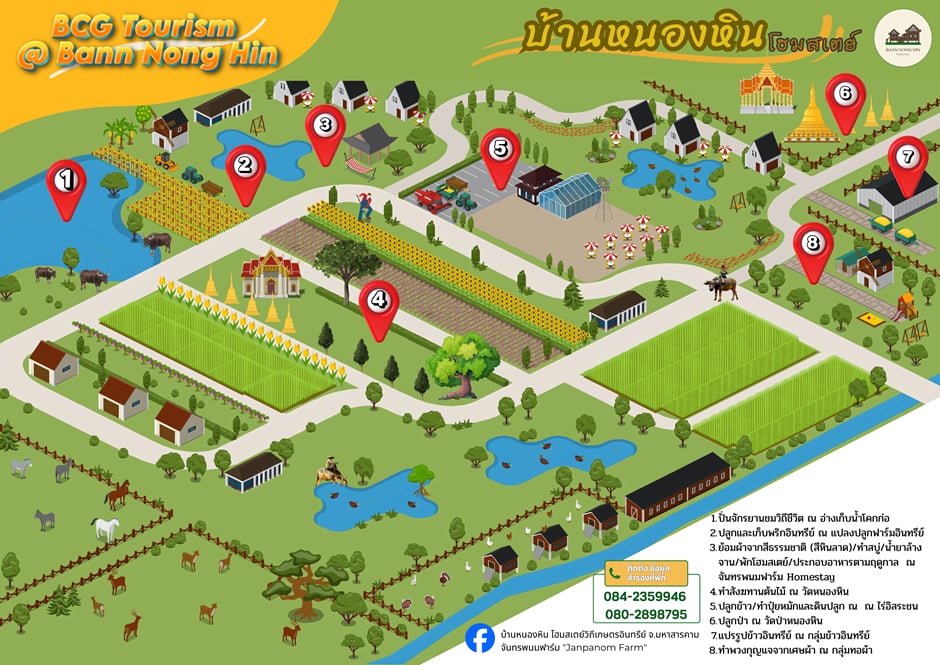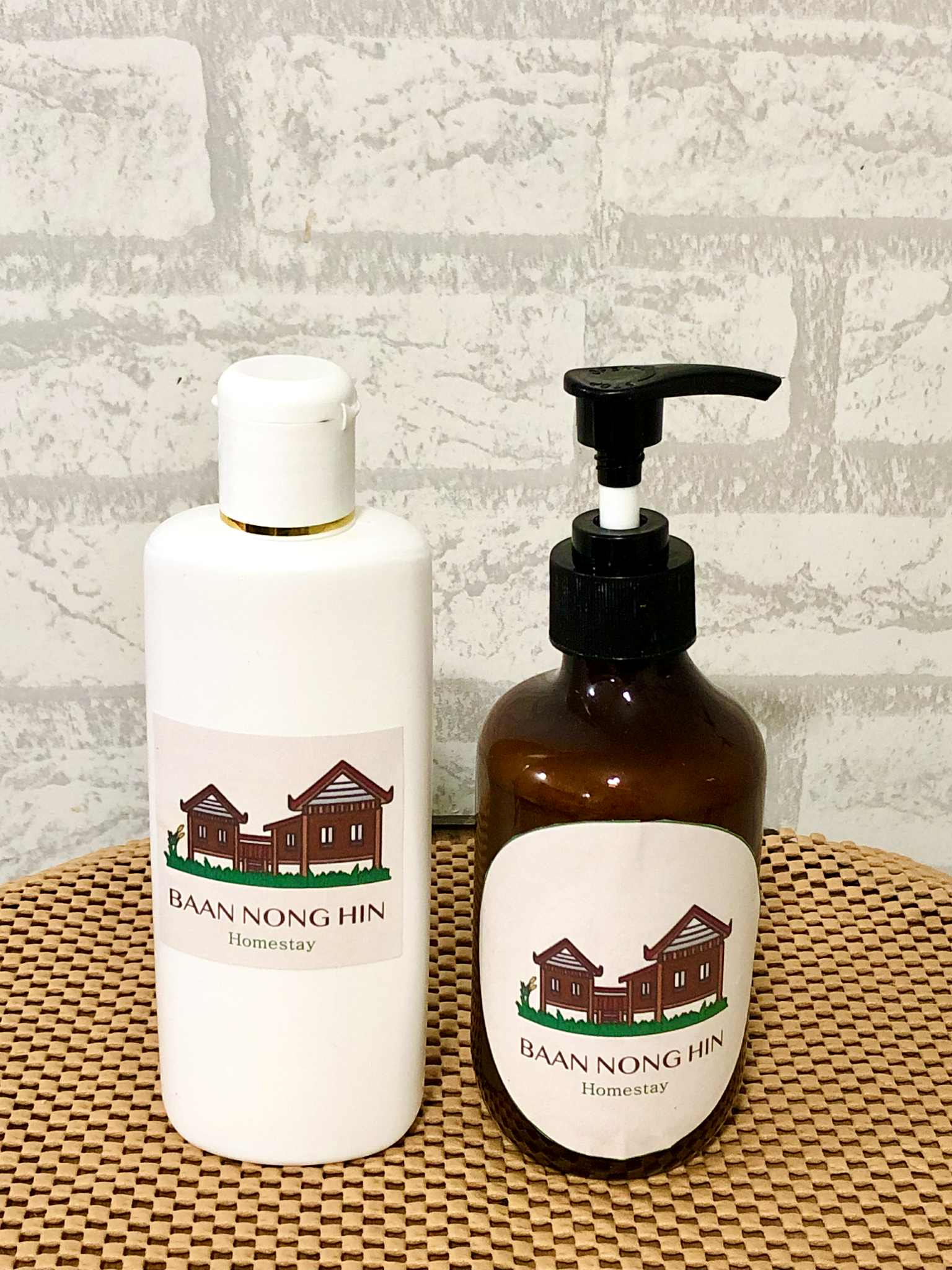
Developing a Model Community in Sustainable Tourism and Service Management through Digital Innovation Based on the BCG Model
ผู้รับผิดชอบ ให้ข้อมูล : Dr. Narisara Kkamsing
SDG ที่เกี่ยวข้อง
เป้าหมายย่อย เป้าหมายย่อย เป้าหมายย่อยความสอดคล้องกับยุทธศาสตร์มหาวิทยาลัย : พัฒนาระบบบริหารจัดการบนพื้นฐานธรรมาภิบาลและจริยธรรม
แหล่งงบประมาณ : งบประมาณแผ่นดิน
กลุ่มเป้าหมาย : ชุมชน
Project Implementation Area : Nong Hin Village ตำบล Koeng อำเภอ Mueang Maha Sarakham จังหวัด Maha Sarakham 44000
Project Duration: October 1, 2024 – September 30, 2025
Objectives :
1. To study the community’s conditions and potential for developing a model of sustainable tourism and service management using digital innovation based on the BCG Model.
2. To enhance community capacity and knowledge in sustainable tourism and service management through the BCG Model.
3. To develop knowledge and skills in applying digital innovation for sustainable tourism and service management under the BCG Model.
4. To design and add value to community products and services through activities and tourism routes based on the BCG Model.
5. To propose guidelines for developing model communities in sustainable tourism and services management using digital innovation and the BCG Model.
6. To integrate teaching, learning, and academic service, allowing students and faculty to collaborate creatively with communities in local development.
Activities :
Activity 1: Meetings with community members to understand the project objectives and assess the village potential for model community development in sustainable tourism and services using the BCG Model.
Activity 2: Practical training workshops to enhance knowledge and skills in sustainable tourism and service management through the BCG Model.
Activity 3: Workshops on applying technology, innovation, and creativity to develop tourism products and services while considering environmental and resource costs.
Activity 4: Workshops on designing and adding value to community products and services through tourism activities and routes based on the BCG Model.
Activity 5: Production of promotional media to publicize the model community for sustainable tourism and services using digital innovation and the BCG Model.
Activity 6: Study of factors influencing integrated tourism management under the BCG Model and their impact on tourists’ decision-making in Maha Sarakham and Kalasin provinces.
Number of project participants: 52 people
Project Budget: 250,000 Baht
Results :
1. 35 community members understood the project objectives and village potential for model community development.
2. 35 community members gained knowledge in sustainable tourism and service management via the BCG Model.
3. 35 community members learned how to apply digital innovation for sustainable tourism and service management.
4. 35 community members acquired skills to design and add value to community products and services through tourism activities and routes under the BCG Model.
5. Two promotional media were produced to promote the model community.
6. One academic article was published.
Results society :
Economic aspect: The model community in sustainable tourism and services using digital innovation based on the BCG Model in Maha Sarakham was developed. New quality tourism products were created, enhancing tourists’ confidence and meeting national tourism development goals. Beneficiaries, including the Ban Nong Hin community, gained income, more occupational opportunities, and economic stability. Income distribution reduced local inequalities, supporting national strategic goals of stability, prosperity, and sustainability.
Social aspect: The model community in sustainable tourism and services using digital innovation based on the BCG Model was developed. The project enhanced community knowledge in sustainable tourism management, distributed income, and promoted pride in local lifestyle, culture, and heritage. It strengthened Thai identity and the local economy, creating additional value from community products and services.
Environmental aspect: Community members developed skills in sustainable tourism management and digital innovation, improving service readiness for tourists. Practices introduced included organic farming, composting, low-carbon tourism, and using technology to measure sustainability outcomes. Academic output from the project can be published nationally and internationally and extended into further research. Students and faculty integrated teaching with community service, fostering local development aligned with RMU’s mission.
Participation :
Faculty and students actively contributed to developing standards and supporting sustainable tourism development in communities across Maha Sarakham Province. By applying knowledge from classrooms and research, they helped advance community capabilities in sustainable tourism management, covering natural and environmental resources as well as cultural traditions.
The BCG Tourism approach served as a tool to foster community pride, appreciation for local lifestyles and culture, and the preservation of traditional knowledge and the environment. It also raised awareness of conserving and restoring natural resources and Thailand’s cultural heritage.
The project promoted socially and environmentally friendly food products, such as organic and agricultural products, and provided responsible tourism experiences. Sustainability concepts were integrated into tourism activities, including learning about organic farming practices, producing compost from waste, and engaging in low-carbon tourism. Technology was used as a measurement tool to help tourists observe tangible sustainability outcomes.
Project continuity :
Monitoring included community group chats and field visits to assess project utilization and community needs. Results informed budget proposals for future project continuation.
Problems obstacles :
1. Community interest exceeded the target group.
2. Scheduling conflicts between students, faculty, and community members made planning fieldwork challenging.
Improvement :
1. Based on feedback from project participants indicating that additional community members wished to join and requested more activities, the project team clarified the objectives and conducted a survey to identify the community’s additional knowledge needs and the number of interested participants. This process was also intended to prepare budget proposals for academic service, including both strategic funds and funding from other projects. The feedback reflects the effectiveness of the project implementation. Therefore, in planning future activities, the project team and the academic department will continue to focus on promoting, supporting, and encouraging students and staff to expand opportunities for the broader community to develop skills and acquire knowledge, ultimately enhancing the quality of life for community members, the university, and Thai society.
2. Meetings were held to finalize the fieldwork schedule in coordination with the community in advance. It was also proposed that the university consider allocating dedicated time for faculty and students—for example, one available day per week—for conducting community-based academic services, which is a key mission of Rajabhat Maha Sarakham University.
Suggestions :
Project Feedback from Participants:
1. Participants would like the project to continue to allow further development.
2. The project is very good and beneficial; participants expressed their gratitude to Rajabhat Maha Sarakham University for organizing it.
3. The instructors provided comprehensive knowledge.
4. The activities were enjoyable and educational.
5. Participants requested additional topics from instructors and noted that more community members wish to join.
6. Faculty and students conducted the project well; the knowledge gained is practical and useful.
7. There is interest in training for new careers beyond agriculture.
Policy Recommendations:
1. Government and university policies should support the continuous implementation of such projects to ensure ongoing learning and capacity building within communities.
2. Collaboration with relevant agencies should be strengthened, including partnerships between universities, local authorities, and public and private organizations, to provide sufficient knowledge, budgets, and resources.
3. Enhance community personnel capacity by promoting knowledge of digital technology, online marketing, and innovations related to the BCG Model to improve tourism and service quality.
4. Expand knowledge dissemination to a diverse range of target groups, including youth, farmers, and local entrepreneurs, to ensure broad and inclusive participation.
5. Support the creation of new careers and product processing by promoting training programs aligned with economic changes, such as agricultural product processing, creative tourism, and digital service businesses.
Recommendations for Future Projects:
1. Expand training topics to include areas such as community product development, advanced online marketing, branding, and sustainable environmental management.
2. Develop monitoring and evaluation systems to track participant outcomes after project completion, including application of knowledge in careers, income generation, and community development.
3. Increase the number of participants and target groups, allowing those who could not join previously, especially youth and tourism-related entrepreneurs, to participate in the future.
4. Strengthen tourism community networks by organizing multi-community projects to exchange knowledge and foster collaboration between areas.
5. Support business development through business matching between communities, entrepreneurs, and investors to expand market opportunities and commercial potential.






































